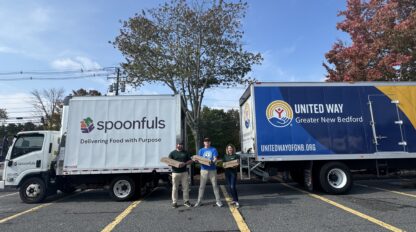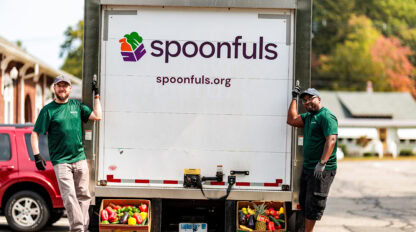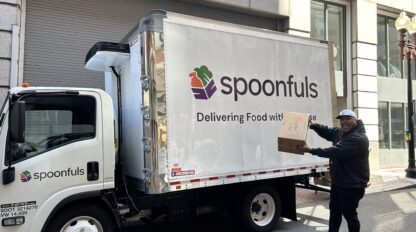Spoonfuls Spotlight: Martin Luther King, Jr. Family Services

With threats to critical food assistance resources mounting, we’re uplifting the vital work of our community partners who continue to meet a growing need for good food – plus, the powerful support that food recovery offers their programs.
We recently connected with Lenise Williams, Administrative Assistant and Office Manager, and Claudia Pazmany, Chief Development Officer, at Martin Luther King, Jr. Family Services (MLKFS) to discuss food insecurity in Springfield and how our partnership has an impact in the neighborhood.
Tell us about MLKFS. How does your food program work?
Lenise: MLKFS has been in business for over 40 years. We’re a community center that offers literacy-based afterschool, recreational, and educational youth programs, an emergency food pantry, and other services to fulfill the dynamic needs of our community here in Springfield.
Claudia: We are nestled in the heart of Mason Square, our neighborhood in Springfield, which is a federally declared food desert. That means residents have limited access to affordable, healthy food due to the lack of grocery stores nearby. The impact of our pantry and the relationships that we form with clients are deeply important to our community. Lenise ensures the program incorporates health and wellness education through partnerships with multiple agencies to support our pantry and neighbors. She and her team also try to personalize the experience, so our food pantry is a choice program, ensuring that folks get to make decisions regarding their nutrition and what works best for them. Oftentimes, healthy recipes and even food demonstrations are offered to help make sense of foods that might be new to our client, or provide a healthy preparation alternative.
Whom do you serve at your pantry? How does food from Spoonfuls help?
Lenise: We serve people of many backgrounds: English[-speaking], Spanish, Russian, Creole, Vietnamese – lots of different populations. But all of these individuals benefit from the supplemental fresh food that Spoonfuls delivers to us. Meat, vegetables, and fruits are all healthy options that we get from the Spoonfuls truck. And the food goes quickly every week, especially when we’re in between deliveries from other food sources. We rely on Spoonfuls to fill in the gaps.
Claudia: Being in an area historically shaped by disinvestment and systemic inequities, being a food desert, we lack a full-service grocery store within walking distance. That forces residents to rely heavily on convenience stores or fast-food restaurants, which do not offer the quality of food that Spoonfuls provides. Among the leading chronic conditions of our neighbors, obesity affects 30% of the adult population, and 20% of residents are living with either diabetes or pre-diabetes. And we know that there are an estimated 15,000 people without reliable access to food. The food we offer at our pantry can be the only healthy food source our neighbors have easy access to in any given week.
We’ve been hearing from many of our partners that recent federal funding cuts and other threats to safety net programs mean more people are seeking food assistance. What are you seeing at your program?
Lenise: I’m seeing new people come through our pantry every week. There’s a desperate need for food right now. We’re seeing people who have utilized SNAP, who still utilize SNAP, needing more support now. At our pantry, we’re limited by the amount of food that we can order from local food banks, and we’re limited by the size of our space. Those barriers, along with the increasing need, stretch us thin and make every bit of food that we can offer, including what we get from Spoonfuls, that much more impactful.
Claudia: We’re seeing about 40 new faces every week – a 20% increase in the number of people we serve in just the past few months. And, with more cuts and threats to safety net programs looming, we anticipate the number to grow.
From your perspective, what does the pantry, and the food you provide there, mean to people?
Lenise: People are so thankful for the pantry and recovered food. They are all so relieved to have more reliable access to good food. A lot of folks are ashamed to come to a pantry, but when they come to MLKFS, they’re met with genuine care. We’re relationship-building and community-building around food. People who come to get support are so appreciative.
You mentioned that Rich, one of Spoonfuls’ Food Recovery Coordinators who now delivers to MLKFS, attended one of your youth programs as a kid. What does it mean to you to see your services come full circle in that way?
Claudia: Rich going on to serve his community is a testament to the importance of resources like MLKFS, where we have built a culture around instilling a legacy of living in service of others. He is so full of joy, and it’s inspiring to see the positive ripple effect in our region.
Lenise: He was with us as a little guy, and now he’s working with us as a big guy! We’re family!
Claudia: People like Rich, who have lived experience in our community and work alongside us, are so valuable because they have a deeper understanding and connection to the needs of this community. It makes such a difference to work with a community-led approach.
Let’s talk partnership. What’s a word that comes to mind when you think about the partnership between MLKFS and Spoonfuls?
Lenise: Grateful. I see the looks on our clients’ faces, people who might’ve been afraid to come through the door to get help initially, but on the other side of the experience, they’re so relieved and grateful. Spoonfuls’ food is such a help, both to our staff to ensure we have a stocked pantry, and to those we serve who rely on it. We’re all truly grateful.
Claudia: Abundance. We’re a community that’s used to the word “scarcity,” and it can feel like there’s not enough support to go around. MLKFS tries to be that place where there is equitable access to the resources people need, and with community food partners like Spoonfuls, it feels like there’s an abundance.


